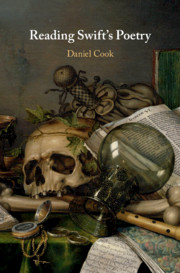Afterword
Published online by Cambridge University Press: 10 August 2020
Summary
Published posthumously, ‘On the Day of Judgement’ was written, according to current critical consensus, sometime between Verses on the Death of Dr Swift, D.S.P.D. in 1731 and On Poetry: A Rapsody in 1733.1 Shorter and blunter than practically all of Swift’s other poems in the period, ‘Day’ showcases a new flair for dramatic satire. Swift’s adoption of the voice of Jove is framed on the page with quotation marks and prefaced with dramatic signage (‘Jove, nodding, shook the Heav’ns, and said …’). The ensuing speech takes up twelve of the twenty-two lines, and closes the poem. This theatricality distracts us from the poem’s primary voice, one not unlike the egoistic Stroller later used in ‘The Legion Club’ or the millennialist visionaries heard in the eschatological poems that appeared with some regularity in the first three decades of the century: ‘With a Whirl of Thought oppress’d, / I sink from Reverie to Rest’. ‘An horrid Vision seiz’d my Head’, he says of himself, reducing everyone else to silent, sorrowful corpses (‘the Graves give up their Dead’, ‘each pale Sinner hangs his Head’). Unlike the narrator, who cannot control his visions, Swift’s Jove revels in his moral judgement. He spares names, but he does not spare the lash: ‘Offending Race of Human Kind, / By Nature, Reason, Learning, blind’.
- Type
- Chapter
- Information
- Reading Swift's Poetry , pp. 287 - 288Publisher: Cambridge University PressPrint publication year: 2020

